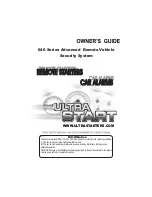
Rev. 4245-v3_2_en
2
Fire
Lights up
one
time
for
10
seconds
when
the smoke
density
reaches the
activation
threshold
Not lit
+
Detector failure
Triple
blink
every 25
seconds
Not lit
+
Powering up
Not lit
Any
Primary battery
failure
Not lit
Any
+
Secondary
battery failure*
Not lit
Any
+
Power failure
Triple
blink
every 25
seconds
Not lit
+
Tampering/
Tamper recovery
Lights up
one time
for
0.2 seconds
Not lit
+
Network search
Not lit
Blinks with
frequency of
5Hz
for
1 to
60 seconds
−
No network
Not lit
Double
blink
every 25
seconds
−
Radio module
failure
Not lit
Triple
blink
every 25
seconds
+
+: notification issued;
–: notification not issued
*: with secondary battery installed
Notes
1
The
«Power failure»
notification is processed by the
red
LED
if both batteries are discharged or if one of the batteries is
missing and the second battery is discharged.
2
If
«Primary battery failure»
notification appears,
replace
the battery within
two months
.
7
Operating Modes
The detector provides for
«Registration» and «Test» modes.
7.1
«Registration»
mode is intended for registering the
detector in the wireless network in which it supposed to
operate (see
p.8.3
).
7.2
«Test»
mode is intended for testing electronic and
optical circuits of the detector.
The mode is activated upon a command from the control panel
or LT. Within 5 seconds after the command receipt, the
detector should issue
«Test fire» notification (in case of
detector normal operation) or
«Detector failure» or «Power
failure
» notifications (in case of corresponding failures).
8
Pre-Starting Procedure
8.1
After transportation in conditions differing from those of
operation, keep the detector unpacked for 4 hours in the
expected operating conditions.
8.2 Running Detector. Replacing Batteries
WARNING!
Lithium-thionyl-chloride batteries have an effect of
«passivation» to provide the possibility of long-term storage. To
provide battery normal operation after long-term storage, hold
an
«activation» procedure.
Step-1
Turn the detector
’s electronic unit
counter-clockwise. Remove the
electronic unit from the detector
base.
Step-2
When using
one
battery to switch the detector ON,
insert
the
Primary
battery.
Note
– When using
two
batteries, it is recommended to
insert the
Secondary
battery first, and then the
Primary
battery. The Secondary battery can be inserted up to
1
minute
after inserting the Primary battery.
To replace the battery, remove the old one, and after at
least 30 seconds insert the new one.
The red LED lights up for
1 to 40 seconds
– the battery
activation and checking period.
If after
40 seconds
the
red
LED flashes
triply
every 25
seconds, re-activate the battery by removing it, and after at
least 30 seconds reinserting it.
Warning! If two batteries have been inserted, replace
both batteries.
8.3
Registering the Detector in the Wireless
Network
Detector registration procedure is required for detector
identification in the wireless network in which it is supposed
to operate.
Step-1
According to Astra-Zitadel System Control Panel`s
Operating Manual *
perform the following procedure:
1)
Install
Software **
(MSS Astra-Z, Pconf-Z or MSS Astra
Pro) intended for configuring Control Panel.
2)
Create wireless network
Step-2
Perform
par.8.2
Step-3
Switch the control panel to
Wireless device registration
mode by the method described in the appropriate Control
Panel
Operating manual *
Step-4
Initiate detector registration procedure by one of
2
methods
:
a) using the
LT
(step-5)
;
b) using the
Reg
plug and the
tamper switch
(step-6)
WARNING!
Avoid to initiate registration procedure on several
detectors simultaneous
Step-5
Initiating Detector
Registration Using the LT:
- Press the lower button on the
LT and hold until a beam
appears.
- Direct the laser beam at the
detector LED.
- Irradiate the LED for
1 second
.
The detector
red
LED lights up for
2 seconds
, and then
the detector switches to wireless network search mode and
the detector
white
LED blinks at a frequency of
5 Hz
.
No more than 10 m
At least 0.1 m






















